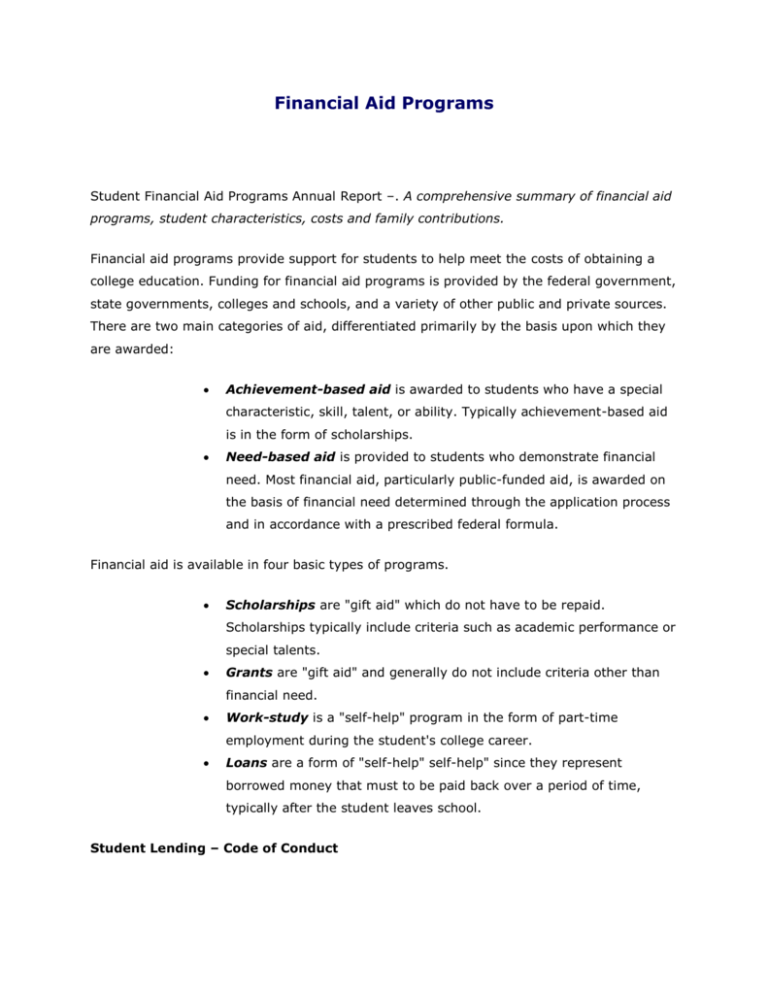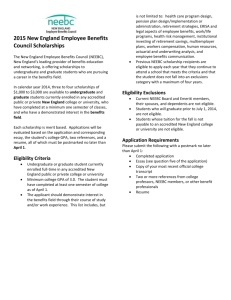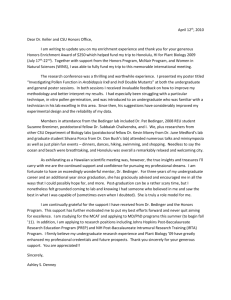Types of Financial Aid
advertisement

Financial Aid Programs Student Financial Aid Programs Annual Report –. A comprehensive summary of financial aid programs, student characteristics, costs and family contributions. Financial aid programs provide support for students to help meet the costs of obtaining a college education. Funding for financial aid programs is provided by the federal government, state governments, colleges and schools, and a variety of other public and private sources. There are two main categories of aid, differentiated primarily by the basis upon which they are awarded: Achievement-based aid is awarded to students who have a special characteristic, skill, talent, or ability. Typically achievement-based aid is in the form of scholarships. Need-based aid is provided to students who demonstrate financial need. Most financial aid, particularly public-funded aid, is awarded on the basis of financial need determined through the application process and in accordance with a prescribed federal formula. Financial aid is available in four basic types of programs. Scholarships are "gift aid" which do not have to be repaid. Scholarships typically include criteria such as academic performance or special talents. Grants are "gift aid" and generally do not include criteria other than financial need. Work-study is a "self-help" program in the form of part-time employment during the student's college career. Loans are a form of "self-help" self-help" since they represent borrowed money that must to be paid back over a period of time, typically after the student leaves school. Student Lending – Code of Conduct Each CSU campus abides by a Code of Conduct that addresses its relationship with providers of educational loans. Click here to see the Code of Conduct. Federal Financial Aid Programs Federal financial aid programs provide 64 percent of the funding currently available for student financial aid. The following are the primary federal programs through which CSU students receive aid. Federal Pell Grant - provides the foundation in the undergraduate's financial aid ""package" to which other financial aid may be added based upon the total amount a student is eligible to receive. For 201314, Federal Pell Grant awards for full-time students range from $650 to $5,645. Students admitted to postbaccalaureate teacher credential programs and enrolled at least half time in courses required to obtain a teaching credential may be eligible to receive a Federal Pell Grant. Federal Pell Grant is limited to 6 years or its equivalent. Federal Supplemental Educational Opportunity Grants (FSEOG) - provides grant assistance for undergraduates with the greatest financial need. These federal grants range from $100 to $4,000 per award year. Funds are limited so most CSU students do not receive the maximum award. Federal Work-Study Program (FWS) - provides both on- and offcampus jobs for eligible undergraduate and graduate students through private or public non-profit organizations, local school districts, and other local, state, or federal agencies. Private sector employers may hire work-study students if the employers provide jobs related to a student's course of study or career objective. A portion of FWS funds are also dedicated to promoting community service on the part of students. Federal Perkins Loan - provides low-interest loans for eligible undergraduate and graduate students with preference to students with exceptional financial need. The annual loan limit is $5,500 for undergraduate students and $8,000 for graduate students. The aggregate loan limits are $27,500 for undergraduate students pursuing a bachelor's degree and $60,000 combined for undergraduate/ graduate or professional study. William D. Ford Federal Direct Loan Program (Direct) - Funding for Direct loans is obtained directly from the Department of Education with funding from the U.S. Treasury. Below are the three types of loans under this program: Federal Stafford Subsidized Loan - provides government insured, long-term, low-interest loans for eligible undergraduate and credential students. The federal government pays the interest on the loan while the student remains enrolled in college. An undergraduate student may borrow up to $3,500 for the first year of study, up to $4,500 for the second year, and up to $5,500 for the third through fifth years. Aggregate undergraduate borrowing may not exceed $23,000. The combined aggregate undergraduate/graduate limit may not exceed $65,500. Federal subsidized loan eligibility is limited to the equivalent of 6 years for the typical 4-year degree program. Federal Stafford Unsubsidized Loan - provides long-term, lowinterest loans for eligible undergraduate and graduate students who generally do not qualify for other need-based financial assistance or students who need loan assistance beyond the maximums provided by the subsidized loan program. The student pays all interest charges on the loan while enrolled in college. The combined total of the Stafford Loan and Unsubsidized Stafford loan may not exceed regular Stafford loan limits ($31,000 for undergraduates/$57,500 for independent undergraduates, and $138,500 for combined undergraduate/graduates). Federal Parent Loan for Undergraduate Students - provides government-insured, long-term, low-interest loans for eligible parents of dependent, undergraduate students who generally do not qualify for other financial assistance. Parents may borrow up to the total cost of their dependent student's education minus any other aid for which the students are eligible. Federal PLUS Loan for Graduate Students - provides governmentinsured, long-term, low-interest loans for eligible graduate students pursuing Masters or Doctoral degrees. Graduate students may borrow up to the total cost of their education minus any other aid for which the students are eligible. The Department of Education's Student Guide provides more comprehensive descriptions of these programs. This guide is available in high school and community college guidance offices as well as athttp://www.ed.gov/prog_info/SFA/StudentGuide/. State of California Financial Aid Programs The California Student Aid Commission (CSAC) administers a number of student financial aid programs designed to assist California students. Brief descriptions of the principal programs administered by CSAC follow and additional information are available at http://www.csac.ca.gov/. Middle Class Scholarship- provides a scholarship to undergraduate students with a family income of up to $150,000. The student must be enrolled at a California State University or University of California and be a CA resident or eligible AB 540 student. The student must file a FAFSA or California Dream Application by the March 2 deadline. For more complete information on the program and eligibility requirements- visit http://www.csac.ca.gov/mcs.asp. Cal Grant A Entitlement Awards - provides need-based grant assistance to low- and middle-income students to offset tuition/fee costs for high graduates with at least a 3.0 grade point average. Recipients must also meet financial requirements. For 2013-14, the maximum Cal Grant A award for CSU students is $5,472 for undergraduates and $6,348 for eligible students enrolled in postbaccalaureate teacher credential programs. These awards are limited to the total amount of the systemwide State Tuition Fee for full-time students. Cal Grant B Entitlement Awards - provides need-based grant assistance to high-potential students from low-income, disadvantaged families to help offset tuition/fee and other costs for high school graduates with at least a 2.0 grade point average. Recipients must also meet financial requirements. In 2013-14, the maximum living allowance is $1,473 and the tuition/fee awards are the same as Cal Grant A ($5,472 or $6,348) for student enrolling at CSU campuses. Cal Grant Community College Transfer Entitlement Awards Community college students who do not already have a Cal Grant may be eligible to receive a Cal Grant A or B Transfer Entitlement awards if they have at least 2.4 grade point average when transferring to a baccalaureate degree granting institution. Eligible applicants must meet financial criteria, have graduated from high school in 2000-01 or later, and be under the age of 28. Competitive Cal Grant Awards -A limited number of Cal Grant awards are currently made available each year on a competitive basis for students who do not qualify for one of the entitlement programs. Aid Programs Administered by the California State University The CSU maintains efforts to ensure educational opportunity for all students. In addition to the significant state subsidy provided to all students who enroll at the CSU, reflected by its low fee structure, the CSU also dedicates a significant amount of its revenues to need-based grants each year. State University Grant (SUG) - provides need-based awards to cover a portion of the State Tuition Fee for eligible undergraduate, graduate, and postbaccalaureate students who are California residents or are otherwise determined as eligible. Systemwide, the priority is to award a SUG at least equal to the amount of the State Tuition Fee ($5,472 for undergraduates, $6,348 for teaching credential and $6,738 for graduate and postbaccalaureate students) to eligible students who apply for financial aid by March 2, who have an expected family contribution (EFC) of $4,000 or less, and who are not receiving a Cal Grant or other award designated to cover fees. Funding for ths program is limited. Students must reapply for consideration every year. State University Grant awards are limited based on the number of units a student has earned and published length of their academic program. For more complete information, review the financial aid web site(s) of the campuses you are interested in or currently attending. Educational Opportunity Program (EOP) Grant - provides assistance to economically and educationally disadvantaged undergraduates. Recipients must be California residents who are admitted to a CSU campus through theEducational Opportunity Program. EOP students may receive a grant, based on need, of up to $2,000 per year. Aid Programs Administered by CSU Campuses Scholarships - The availability and application procedures for institutional scholarships vary among the campuses. Other Aid Programs - The availability of other aid programs varies among institutions. Several CSU campuses have small institutional long-term loan programs and a number of them currently participate in the State Work-Study program.







